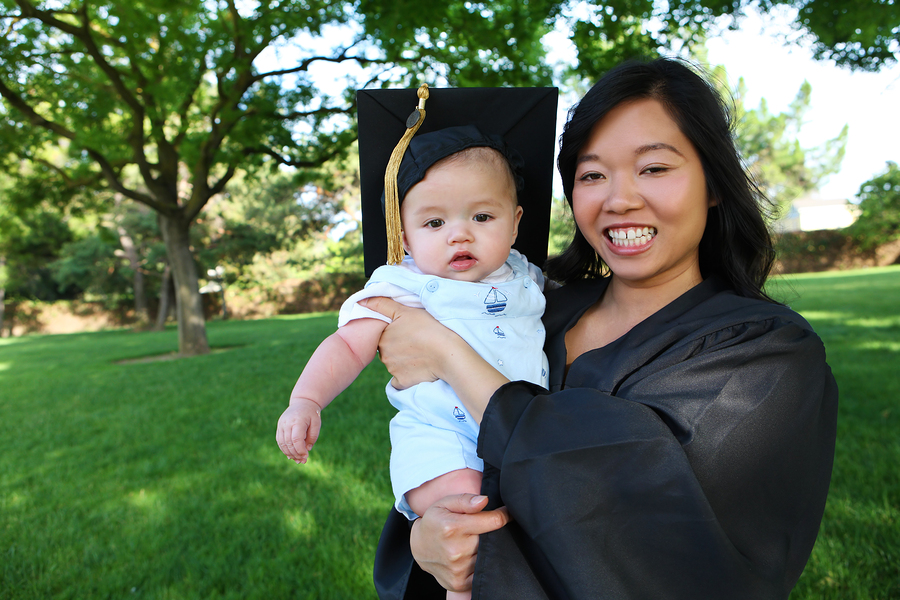If your student loan payment is squeezing your budget too hard, change it.
On average, monthly student loan payments run about $350 a month – and that’s an expense many single moms really can’t afford on top of childcare costs and regular monthly bills. Unfortunately, many single moms just stop making payments, not realizing the extremely negative long-term effects that will take on their finances.
There’s a lot you can do to lower those monthly payments before the problem gets too far out of control. And once you get your budget on a better track or start earning more money, you’ll be in better shape to pay off those student loans once and for all.
4 Ways to Reduce Your Payments
When it comes to lowering your monthly student loan payments, you have a lot of options. The more you can pay, the faster your debt will go away. But even making small payments is better for your finances in the long run – especially if that gives you the breathing room you need to pay all of your other bills without stressing out every month.
Option 1: Automatic payments can lower your interest rate. If you agree to sign up for automatic payments, many student loan servicers will automatically lower your interest rate by 0.25%. I know that doesn’t sound like much, but even a quarter-point decrease can save you hundreds – or even thousands – of dollars in interest payments over the life of your loan. Make sure you always have enough in your checking account to cover the automatic payment.
Option 2: Pick a different repayment plan. Most people are automatically directed to a standard repayment plan, but there are other options available to single moms. You may qualify for one of six special repayment plans that are available for federal student loans. You can find more detailed information about those six plans at www.studentaid.gov, but here’s the gist:
- Graduated: You start with smaller payments, and your payments get bigger every two years for up to ten years.
- Extended: You can get a longer loan term, up to 25 years, which means lower monthly payments.
- Pay As You Earn (PAYE): Puts a cap on your payments of up to 10% of your discretionary income* AND increases your loan term (up to 20 years).
- Revised Pay As You Earn (REPAYE): Your monthly payment will equal 10% of your discretionary income, and extends your loan term to 20 years.
- Income-Based Repayment Plan (IBR): Your monthly payments will be either 10% or 15% of your discretionary income, depending on when you first got your loan. Also, your loan term can be extended for up to 25 years.
- Income-Contingent Repayment Plan (ICR): This option is great for self-employed people whose monthly income fluctuates. Your monthly payments would equal 20% of your discretionary income OR the amount of a standard payment on a 12-year loan, whichever is less. Plus, the loan term can be extended for up to 25 years.
The monthly payments for those income-based repayment – PAYE, REPAYE, IBR, and ICR – plans get recalculated every year based on your updated income, your current family size, and a few other factors.
Note* Discretionary income means the difference between your income and either 100% or 150% of the government poverty guideline.
Option 3: Refinance your loan. Right now, student loan interest rates for undergrad loans are running a little under 5%. If the interest rate on your student loan is higher than that, it may make sense to refinance with a private loan. Lower rates mean lower payments, which helps you pay off your student loans faster and with less stress. On top of that, you can choose a longer loan term, which stretches out your payments, lowering them even further. That option – the longer loan term – will take less cash every month, but will cost you more in interest over the life of your loan. And with a strong credit score, you’ll receive the best loan terms. Check out this NerdWallet guide to the best student loan refinancing deals.
Option 4: Consolidate your loans. You can save money and effort by rolling multiple student loans into one federal consolidated with a lower interest rate. Not only will that reduce your overall monthly payment, you’ll also save a lot of money in interest over the life of your loan. Make sure that your credit score is in good shape so you’ll qualify for the most advantageous loan terms. You can learn more about federal consolidation loans here.
Any of these choices will lower your monthly student loan payments, adding a little breathing room back into your budget. And the sooner you get started, the sooner you’ll be able to manage your monthly expenses without breaking a sweat.

